speechonEducation关于教育的英文演讲
课前英文演讲
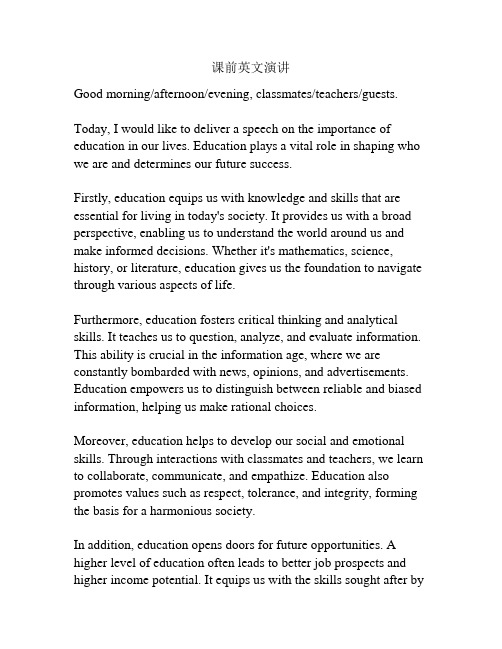
课前英文演讲Good morning/afternoon/evening, classmates/teachers/guests.Today, I would like to deliver a speech on the importance of education in our lives. Education plays a vital role in shaping who we are and determines our future success.Firstly, education equips us with knowledge and skills that are essential for living in today's society. It provides us with a broad perspective, enabling us to understand the world around us and make informed decisions. Whether it's mathematics, science, history, or literature, education gives us the foundation to navigate through various aspects of life.Furthermore, education fosters critical thinking and analytical skills. It teaches us to question, analyze, and evaluate information. This ability is crucial in the information age, where we are constantly bombarded with news, opinions, and advertisements. Education empowers us to distinguish between reliable and biased information, helping us make rational choices.Moreover, education helps to develop our social and emotional skills. Through interactions with classmates and teachers, we learn to collaborate, communicate, and empathize. Education also promotes values such as respect, tolerance, and integrity, forming the basis for a harmonious society.In addition, education opens doors for future opportunities. A higher level of education often leads to better job prospects and higher income potential. It equips us with the skills sought after byemployers and increases our chances of achieving personal and professional success.However, education is not limited to classrooms and textbooks. Learning can take place in various settings, such as through personal experiences, travel, and extracurricular activities. It is important that we embrace a lifelong learning mindset and seek opportunities to broaden our horizons.In conclusion, education is a fundamental right that should be cherished and pursued by all. It provides us with knowledge, skills, and opportunities for personal growth. Let us value the education we receive and strive to make the most of it. Remember, education is not a destination but a lifelong journey.Thank you for your attention.。
教育的意义英文演讲稿(精选3篇)
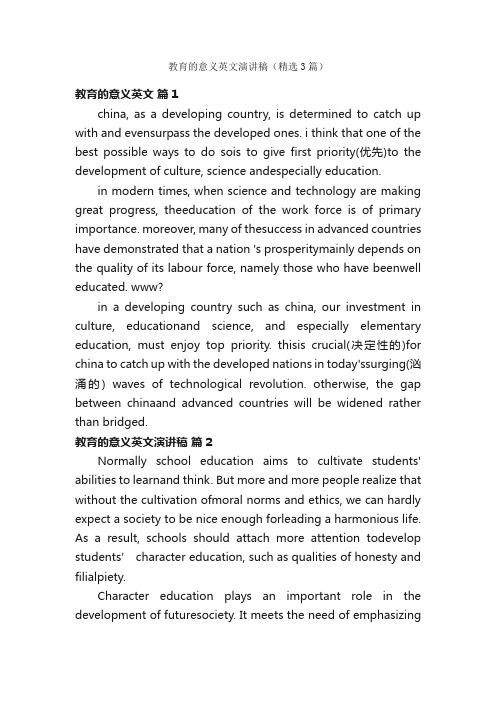
教育的意义英文演讲稿 篇2
Normally school education aims to cultivate students' abilities to learnand think. But more and more people realize that without the cultivation ofmoral norms and ethics, we can hardly expect a society to be nice enough forleading a harmonious life. As a result, schools should attach more attention todevelop students’ character education, such as qualities of honesty and filialpiety.
以教育为主题的英语演讲稿范文
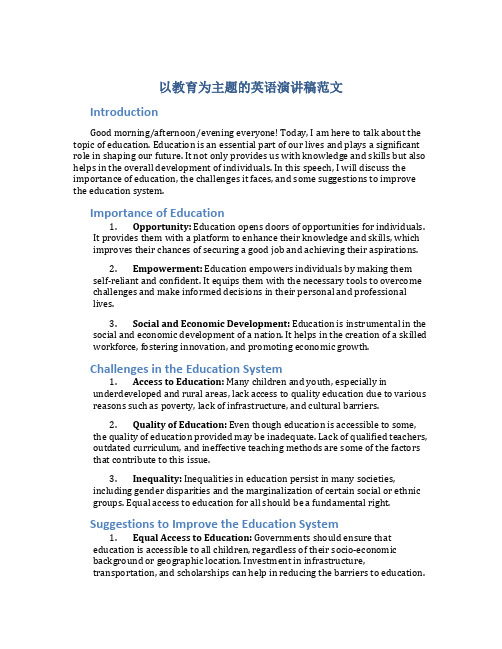
以教育为主题的英语演讲稿范文IntroductionGood morning/afternoon/evening everyone! Today, I am here to talk about the topic of education. Education is an essential part of our lives and plays a significant role in shaping our future. It not only provides us with knowledge and skills but also helps in the overall development of individuals. In this speech, I will discuss the importance of education, the challenges it faces, and some suggestions to improve the education system.Importance of Education1.Opportunity: Education opens doors of opportunities for individuals.It provides them with a platform to enhance their knowledge and skills, which improves their chances of securing a good job and achieving their aspirations.2.Empowerment: Education empowers individuals by making themself-reliant and confident. It equips them with the necessary tools to overcome challenges and make informed decisions in their personal and professionallives.3.Social and Economic Development: Education is instrumental in thesocial and economic development of a nation. It helps in the creation of a skilled workforce, fostering innovation, and promoting economic growth.Challenges in the Education System1.Access to Education: Many children and youth, especially inunderdeveloped and rural areas, lack access to quality education due to various reasons such as poverty, lack of infrastructure, and cultural barriers.2.Quality of Education: Even though education is accessible to some,the quality of education provided may be inadequate. Lack of qualified teachers, outdated curriculum, and ineffective teaching methods are some of the factors that contribute to this issue.3.Inequality: Inequalities in education persist in many societies,including gender disparities and the marginalization of certain social or ethnic groups. Equal access to education for all should be a fundamental right.Suggestions to Improve the Education System1.Equal Access to Education: Governments should ensure thateducation is accessible to all children, regardless of their socio-economicbackground or geographic location. Investment in infrastructure,transportation, and scholarships can help in reducing the barriers to education.2.Quality Education: Upgrading the qualifications and training ofteachers is crucial for improving the quality of education. Regular assessments of schools, curriculum revisions, and the integration of technology in teaching can also enhance learning outcomes.3.Inclusive Education: Efforts should be made to eliminate genderdisparities and social inequalities in education. Special provisions should be made for children with disabilities to ensure their full participation ineducation.4.Life Skills Training: Besides academic knowledge, education shouldalso focus on imparting life skills such as critical thinking, problem-solving,communication, and teamwork. These skills are essential for success in both personal and professional life.5.Parental Involvement: Parents should be encouraged to activelyparticipate in their child’s education. Regular parent-teacher meetings,workshops, and awareness campaigns can help in fostering a positive learning environment.ConclusionIn conclusion, education is the key to individual growth, societal development, and a prosperous nation. It provides individuals with the necessary tools to succeed in life and contribute to the progress of society. However, various challenges such as lack of access, quality, and inequality hinder the effectiveness of the education system. By ensuring equal access to education, improving its quality, promoting inclusivity, and focusing on life skills, we can overcome these challenges and build a better future for all. Together, let us work towards creating an education system that nurtures and empowers every individual. Thank you!。
英语上台演讲稿子范文
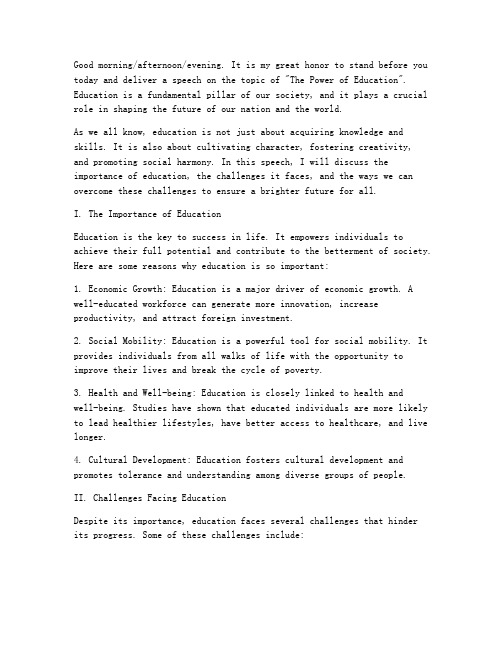
Good morning/afternoon/evening. It is my great honor to stand before you today and deliver a speech on the topic of "The Power of Education". Education is a fundamental pillar of our society, and it plays a crucial role in shaping the future of our nation and the world.As we all know, education is not just about acquiring knowledge and skills. It is also about cultivating character, fostering creativity,and promoting social harmony. In this speech, I will discuss the importance of education, the challenges it faces, and the ways we can overcome these challenges to ensure a brighter future for all.I. The Importance of EducationEducation is the key to success in life. It empowers individuals to achieve their full potential and contribute to the betterment of society. Here are some reasons why education is so important:1. Economic Growth: Education is a major driver of economic growth. A well-educated workforce can generate more innovation, increase productivity, and attract foreign investment.2. Social Mobility: Education is a powerful tool for social mobility. It provides individuals from all walks of life with the opportunity to improve their lives and break the cycle of poverty.3. Health and Well-being: Education is closely linked to health andwell-being. Studies have shown that educated individuals are more likely to lead healthier lifestyles, have better access to healthcare, and live longer.4. Cultural Development: Education fosters cultural development and promotes tolerance and understanding among diverse groups of people.II. Challenges Facing EducationDespite its importance, education faces several challenges that hinderits progress. Some of these challenges include:1. Inequality: There is a significant gap in educational opportunities between the rich and the poor. Many children from disadvantaged backgrounds lack access to quality education.2. Lack of Resources: Many schools, especially in rural areas, lack the necessary resources to provide a quality education. This includes inadequate infrastructure, textbooks, and qualified teachers.3. Dropout Rates: Dropout rates are alarmingly high in many countries, particularly in developing nations. This is often due to a lack of motivation, poor academic performance, and economic pressures.4. Gender Inequality: In many parts of the world, girls are still denied the right to education. This not only affects their lives but also hinders the development of their communities and nations.III. Overcoming Challenges to Ensure a Brighter FutureTo ensure a brighter future, we must address the challenges facing education and take concrete steps to overcome them. Here are some ways we can achieve this:1. Increase Investment in Education: Governments should allocate more resources to education, particularly in disadvantaged areas. This includes funding for infrastructure, textbooks, and teacher training.2. Promote Gender Equality: Efforts should be made to ensure that girls have equal access to education. This can be achieved through initiatives such as scholarships, awareness campaigns, and legal reforms.3. Improve Teacher Quality: Qualified teachers are essential for providing a quality education. Governments should invest in teacher training and development programs to improve their skills and knowledge.4. Foster a Culture of Lifelong Learning: Education should not end with formal schooling. We should encourage individuals to pursue lifelong learning and adapt to the ever-changing demands of the workforce.5. Promote Inclusive Education: Schools should be inclusive and cater to the needs of all students, regardless of their background or abilities.This includes providing special education and support for students with disabilities.In conclusion, education is a powerful force that can transform lives and shape the future of our nation and the world. By addressing the challenges it faces and taking concrete steps to ensure a quality education for all, we can create a more equitable, prosperous, and sustainable society.Thank you for your attention, and I welcome any questions or comments you may have.。
教育意义英文演讲稿范文
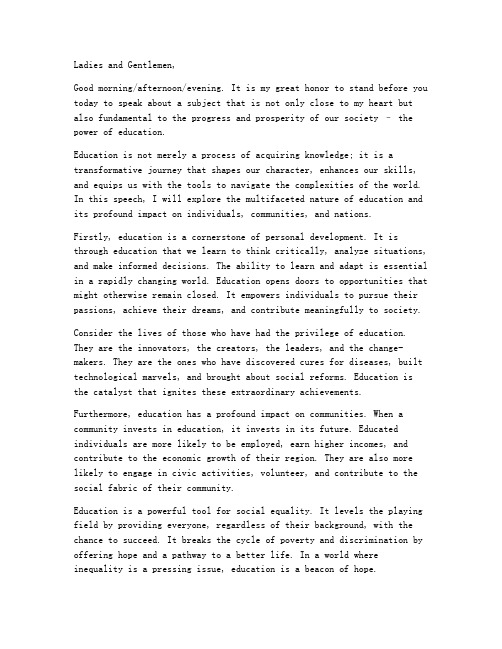
Ladies and Gentlemen,Good morning/afternoon/evening. It is my great honor to stand before you today to speak about a subject that is not only close to my heart but also fundamental to the progress and prosperity of our society – the power of education.Education is not merely a process of acquiring knowledge; it is a transformative journey that shapes our character, enhances our skills, and equips us with the tools to navigate the complexities of the world. In this speech, I will explore the multifaceted nature of education and its profound impact on individuals, communities, and nations.Firstly, education is a cornerstone of personal development. It is through education that we learn to think critically, analyze situations, and make informed decisions. The ability to learn and adapt is essential in a rapidly changing world. Education opens doors to opportunities that might otherwise remain closed. It empowers individuals to pursue their passions, achieve their dreams, and contribute meaningfully to society.Consider the lives of those who have had the privilege of education. They are the innovators, the creators, the leaders, and the change-makers. They are the ones who have discovered cures for diseases, built technological marvels, and brought about social reforms. Education is the catalyst that ignites these extraordinary achievements.Furthermore, education has a profound impact on communities. When a community invests in education, it invests in its future. Educated individuals are more likely to be employed, earn higher incomes, and contribute to the economic growth of their region. They are also more likely to engage in civic activities, volunteer, and contribute to the social fabric of their community.Education is a powerful tool for social equality. It levels the playing field by providing everyone, regardless of their background, with the chance to succeed. It breaks the cycle of poverty and discrimination by offering hope and a pathway to a better life. In a world whereinequality is a pressing issue, education is a beacon of hope.However, the significance of education extends beyond personal and community benefits. It is also crucial for the development of nations. Countries that prioritize education tend to have higher GDPs, better health outcomes, and lower crime rates. Educated populations are more likely to participate in democratic processes, fostering a culture of accountability and transparency.Yet, despite its undeniable benefits, education remains inaccessible to many. In some parts of the world, children are denied the right to learn because of poverty, conflict, or discrimination. This is unacceptable. We must strive to ensure that every child, everywhere, has access to quality education.In conclusion, education is a force for good. It is the key to unlocking the potential of individuals and communities. It is the foundation upon which we build a better world. Let us commit to championing the cause of education, advocating for its importance, and working tirelessly to make it a reality for all.Thank you for listening. Let us embrace the power of education and useit to create a future that is bright, just, and filled with endless possibilities.[Applause]。
关于教育演讲稿英文版
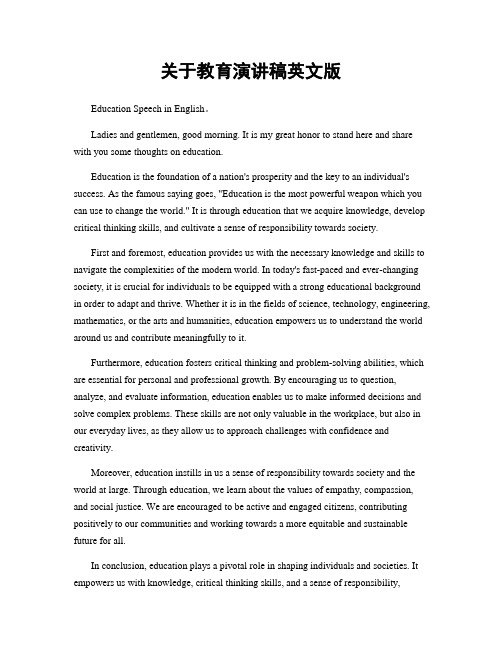
关于教育演讲稿英文版Education Speech in English。
Ladies and gentlemen, good morning. It is my great honor to stand here and share with you some thoughts on education.Education is the foundation of a nation's prosperity and the key to an individual's success. As the famous saying goes, "Education is the most powerful weapon which you can use to change the world." It is through education that we acquire knowledge, develop critical thinking skills, and cultivate a sense of responsibility towards society.First and foremost, education provides us with the necessary knowledge and skills to navigate the complexities of the modern world. In today's fast-paced and ever-changing society, it is crucial for individuals to be equipped with a strong educational background in order to adapt and thrive. Whether it is in the fields of science, technology, engineering, mathematics, or the arts and humanities, education empowers us to understand the world around us and contribute meaningfully to it.Furthermore, education fosters critical thinking and problem-solving abilities, which are essential for personal and professional growth. By encouraging us to question, analyze, and evaluate information, education enables us to make informed decisions and solve complex problems. These skills are not only valuable in the workplace, but also in our everyday lives, as they allow us to approach challenges with confidence and creativity.Moreover, education instills in us a sense of responsibility towards society and the world at large. Through education, we learn about the values of empathy, compassion, and social justice. We are encouraged to be active and engaged citizens, contributing positively to our communities and working towards a more equitable and sustainable future for all.In conclusion, education plays a pivotal role in shaping individuals and societies. It empowers us with knowledge, critical thinking skills, and a sense of responsibility,enabling us to navigate the complexities of the modern world and contribute meaningfully to it. Therefore, it is essential that we continue to prioritize and invest in education, ensuring that it remains accessible, inclusive, and of the highest quality for all.Thank you for your attention. Let us work together to uphold the value of education and create a brighter future for generations to come.。
歌颂教育英文演讲稿范文
Today, I stand before you to share my thoughts on the invaluable role of education in our lives. Education is not merely a means to an end, but a lifelong journey that shapes our personalities, perspectives, and destinies. It is the cornerstone of progress, innovation, and development in any society. In this speech, I will delve into the significance of education, its impact on individuals and society, andthe responsibilities we all share in nurturing a well-educated generation.First and foremost, education empowers individuals to achieve their full potential. It is the key to unlocking doors of opportunities, breaking the cycle of poverty, and fostering personal growth. A well-educated person is equipped with knowledge, skills, and critical thinking abilities, which enable them to navigate the complexities of life with confidence and wisdom.Consider the story of Malala Yousafzai, the youngest-ever Nobel Prize laureate. Malala's unwavering determination to educate herself and advocate for girls' rights in Pakistan made her a symbol of courage and hope. Her journey is a testament to the transformative power of education. It is not just about acquiring academic knowledge; it isabout developing a mindset that embraces curiosity, resilience, and empathy.Education also plays a crucial role in shaping a harmonious society. It fosters social cohesion, reduces poverty, and promotes gender equality. By providing equal access to education, we can bridge the gap between different communities and empower individuals to contribute to the betterment of their society.In today's rapidly evolving world, education is more important than ever. Technology, globalization, and climate change are some of the challenges that require innovative solutions. Education equips us with the necessary skills to adapt to these changes and address the complexissues we face. It encourages us to think critically, question assumptions, and embrace diversity.Let us now explore the impact of education on individuals and society in more detail.1. Personal Development: Education is a journey of self-discovery. It helps us understand our strengths, weaknesses, and interests. Through education, we learn to think independently, communicate effectively, and work collaboratively. These skills are essential for personal growth and success in various aspects of life.2. Economic Growth: Education is a powerful tool for economic development. A well-educated workforce drives innovation, productivity, and entrepreneurship. It attracts foreign investment and creates job opportunities, leading to economic prosperity and stability.3. Social Cohesion: Education promotes social cohesion by fostering mutual understanding and respect among individuals from diverse backgrounds. It encourages empathy, tolerance, and active citizenship, which are crucial for building a harmonious society.4. Gender Equality: Education is a key factor in promoting gender equality. It empowers women and girls to break free from the constraints of tradition and discrimination. Educated women are more likely to participate in decision-making processes, contribute to their families, and uplift their communities.5. Health and Well-being: Education is closely linked to health andwell-being. It enhances awareness about health issues, encourages healthy lifestyles, and improves access to healthcare services. Educated individuals are more likely to make informed choices regarding their health and the health of their families.In light of these benefits, it is our collective responsibility to ensure that education is accessible to all. Governments, educational institutions, and individuals must work together to create an enabling environment for learning and growth.Governments should prioritize education in their budgets, invest in infrastructure, and implement policies that promote inclusive andquality education. Educational institutions should focus on providing awell-rounded curriculum that nurtures intellectual, emotional, and social development. Individuals should take ownership of their learning journey and strive to acquire knowledge and skills that contribute to their personal and societal growth.Ladies and gentlemen,Education is a powerful force that can transform lives and shape the future of our world. It is our responsibility to recognize its importance and work together to ensure that every individual has access to quality education. Let us embrace the spirit of education and create a world where knowledge, wisdom, and compassion guide our actions.Thank you.。
关于教育的讲话 Speech on Education 外国学生英语作文范文
Speech on EducationThere are many ways to deliver a speech on education, however, the ultimate goal is to deliver an engaging presentation that will make an impact or bring about a change. Education is one of the key drivers in a ever- progressive society. It is also one of the best tools to use to rid the society of various problems such as illiteracy and poverty.Short and simple Speech on Education in EnglishSpeech on education aims to provide an insight into the reasons why education is important and its implications if an individual is deprived of this. From a societal perspective, education is one of the basic necessities required to survive in today’s world. Read on to discover how to deliver an effective and engaging speech on education.Speech on Education –Presentation Tips and TricksTry to build rapport with the audienceUse simple and easy-to-understand languageIf jargons are present, try to explain it to the audienceSmileTry to make eye contact with your audienceDo not over extend the speechProvide credits where due.People like to listen to stories, so deliver content in that format.Speech on Education – Sample 1Education is a process that facilitates the acquisition of knowledge, skills, values or beliefs.The system of education (schools and colleges) may be recent, but the learning process has been present since times immemorial. Hunter-gatherer societies passed down their knowledge and skill on how to harvest and eat the right plants. Because eating the wrong plant would mean the difference between life and death. Today, education is one of the most important aspects of society because education provides employment opportunities to all. Moreover, if people are employed, poverty is eliminated.A country like India is a developing nation, hence, education plays an important role in transforming India into a developed nation. Moreover, education acts as an instrument to bring about economic progress and social change. Old beliefs may be rewritten or abandoned; new ideas and thought processes may be the new norms.Speech About Education is the Key to SuccessThough education may be a medium (such as schools, colleges), the learning is always constant. Even when a student transitions into a working professional, they are always learningsomething new. As stated before, education is a crucial tool in eliminating poverty. This is because education bridges the gap between the requirements of the employers and the skills of the employees. When an individual is aptly trained for the job, the pay is significantly higher.However, in today’s economy, education is competitive. Every year, lakhs of students graduate in various streams. This means the job market may get saturated soon as the demand and supply gap is extremely imbalanced. Another downfall, especially in India is the fact that the learning which happens in schools, maybe outdated as per the current trends in various industries. This gap may affect employment opportunities that will directly affect the economy.However, literacy has improved over the past 50 years. In 1951, the literacy rate grew from 18.3% to 74.04% in 2011. That is a substantial improvement has led to the decline of poverty over the years. Nevertheless, many children in India and around the world are deprived of basic education due to a number of reasons. This plight will hopefully change with new government policies and economic landscapes.In conclusion, students are advised to stay in school and make the best use of their time. Other individuals who have completed their schooling must consider learning something new everyday or whenever opportunity presents itself. Education may end after a certain period, but the learning never does.Sample 2 – 3 Minutes Speech on EducationEducation is a process used to acquire knowledge, skills, values or beliefs. Modern methods of education involves teaching, training, discussions and research. However, the learning process has been happening since humansbegan to use tools. Ancient humans, who were hunters and gatherers passed down their skills and techniques over the generations.This learning is important as it means the difference between life and death. For instance, many mushrooms look alike –hence it can be hard to distinguish between the edible and non-edible mushrooms. And if an individual happens to consume a seemingly edible mushroom, but actually ingested a poisonous one, suffering or death may have been imminent. Hence, passing down knowledge over generations was crucial.Speech on Education is PowerToday, education is observed in an environment such as schools and educational institutions. These establishments provide the required facilities and infrastructure to impart knowledge and learning. The preschool is where children between the ages of 3 to 7 are introduced to primary education. It is also known as nursery or kindergarten in various countries. Following preschool in primary education. The average age group of children are between 6 to 12 years of age.Secondary education occurs during adolescence; it is also known as high schools,colleges and vocational schools. Tertiary education is the next stage of education following the secondary. Here, students pursue the courses of their choice. Vocational education is another form of education where skills specific to a particular trade are learnt. For instance, if an individual wants to be a carpenter, they can learn carpentry through an apprenticeship with another experienced carpenter.From a societal perspective, the above levels of education aims to completely wipe out illiteracy rates, however, there are other factors that can prevent children from accessing education.Some of these factors are crippling poverty, high crime rates, unfavorable political environments and more. Ironically, most of these problems can be solved if education is effectively imparted. We need to understand the fact the increased literacy rates can cut down on unemployment and consequently, poverty. If poverty is reduced, then crime rates naturally go down. In other words, for a country to prosper and grow, education plays an instrumental role. >Importance of Education essentially gives individuals the opportunity to take control of their lives.From an economic perspective, education aims to bridge the gap between the employers needs the skills possessed by the job seeker. This means that the industry readily hires candidates with industry-ready skills.In conclusion, education is an important aspect that opens up opportunities to grow and elevate society into the perfection that we dream of achieving for decades.FAQ’s Speech on EducationQuestion 1.How to deliver a good speech?Answer:A good speech has the following aspects:Build rapport with the audience – ask questions or make jokesPresent in a simple and easy-to-understand languageIf jargons are present, try to explain it to the audienceSmileMake eye contact with your audienceDo not over extend the speech, the attention span of the audience is limited.Provide credits where due.People like to listen to stories, so deliver content in that format.。
关于教育的英语演讲英语演讲
关于教育的英语演讲英语演讲Ladies and gentlemen,Today, I stand before you to talk about one of the most important aspects of our society - education. Education is the foundation that shapes the future of individuals and nations. It plays a vital role in shaping the minds of young people, equipping them with the necessary knowledge and skills to thrive in a rapidly changing world.Firstly, education is the key to personal growth and development. It empowers individuals to unlock their potential and pursue their dreams. Through education, we gain knowledge and understanding, enabling us to make informed decisions and contribute meaningfully to society. Education broadens our horizons, exposes us to different perspectives, and encourages critical thinking. It helps us become well-rounded individuals who are aware of the world around us and contribute positively to it.Secondly, education is the cornerstone of progress and innovation. It drives economic growth and social development. A well-educated workforce is crucial for a country's competitiveness in the global marketplace. By investing in education, we invest in the future, creating a skilled workforce that can drive innovation, boost productivity, and foster technological advancements. Education also promotes social mobility, breaking the cycle of poverty and inequality by providing equal opportunities for all.Furthermore, education nurtures values and fosters a sense of citizenship. It instills important moral values such as empathy, tolerance, and respect for others. Education promotes social cohesion by bringing people from diverse backgrounds together, fostering understanding and appreciation for different cultures and perspectives. It encourages civic engagement and active participation in democratic processes, empowering individuals to make a positive change in their communities.However, despite the undeniable importance of education, there are still significant challenges that need to be addressed. Access to quality education remains limited for many children, especially those in disadvantaged communities or marginalized groups. Inadequate infrastructure, lack of resources, and insufficient trained teachers are some of the barriers that hamper educational opportunities. Furthermore, outdated curricula and teaching methods need to be reformed to meet the needs of a rapidly evolving world.In conclusion, education is far more than just a means to acquire knowledge; it is the catalyst for personal growth, social progress, and national development. We must collectively work towards ensuring that education is accessible, inclusive, and of high quality for all. It is our responsibility to invest in education and empower future generations to create a better world for themselves and for generations to come. Thank you.。
教育的意义英文演讲稿
The Significance of Education - English Speech Good afternoon, ladies and gentlemen. Today, I am here to talk about the significance of education. Education is a fundamental element in our lives. It shapes our character, equips us with the necessary skills and knowledge needed to succeed in life, and ultimately impacts society as a whole.First and foremost, education helps to shape our character. Education provides us with the moral, social, and intellectual knowledge that we need so that we can become responsible, well-rounded individuals. Through education, we learn about different cultures, values, and beliefs, and we learn to appreciate and respect differences. Education helps us to understand the world around us, and this understanding can help us to make more informed decisions.Secondly, education equips us with the necessary skills and knowledge needed to succeed in life. Education plays a vital role in our personal and professional growth. It provides us with the skills needed to compete in to day’s global economy. Education helps us to develop critical thinking skills, problem-solving abilities, and effective communication skills. Through education, we learn how to work in teams, make sound decisions, and take calculated risks.Lastly, education impacts society as a whole. Through education, we can build a better future for ourselves and our communities. Education has the power to break down social and economic barriers and to create opportunities for all individuals. Education is a key driver of social mobility and economic growth, and it has the potential to improve the quality of life for all individuals.In conclusion, education is an essential element in our lives. It shapes our character, equips us with the necessary skills and knowledge needed to succeed in life, and ultimately impacts society as a whole. We should all recognize the significance of education and strive to provide ourselves and our communities with the best education possible. Thank you for listening.。
- 1、下载文档前请自行甄别文档内容的完整性,平台不提供额外的编辑、内容补充、找答案等附加服务。
- 2、"仅部分预览"的文档,不可在线预览部分如存在完整性等问题,可反馈申请退款(可完整预览的文档不适用该条件!)。
- 3、如文档侵犯您的权益,请联系客服反馈,我们会尽快为您处理(人工客服工作时间:9:00-18:30)。
s p e e c h o n E d u c a t i o n 关于教育的英文演讲
集团标准化工作小组 [Q8QX9QT-X8QQB8Q8-NQ8QJ8-M8QMN]
Speech
1 Good morning, everyone! This week, we are going to learn a new topic ——the Aims of Education. Differ from W hitehea d’s idea; I think the aim of education is to help people form a lifelong learning consciousness. In my eyes, education is not an end, but a means to an end. In other words, we do not educate children only for teaching them knowledge but to help them form
a lifelong learning consciousness.
2 We can see that, as education appeared, the aim of it has always been a hot topic to human beings, especially the great thinkers. Their ideas
towards the aim of education reflect the educational changes in human society. That is to say the aim of education is not static. In ancient Greek, Aristotle thought that “Education must aim at the development of the full potentialities of each man”. Later, it developed into the idea of training young people to be well-educated gentlemen or citizens in Henry Newman’s workThe Idea of a University.
3 As the society develops, the aim of education has taken in new meanings and implications-----to educate and train people to be all-roundly
cultivated persons. To achieve this goal, one has to spend his whole life to learn. However, in the usual case people just spend some years on study in schools or universities. After they leave school, they seldom pick up books. Now the government is advocating building a “learning society”. It
provides people chances to do some continuous learning in other schools besides the formal ones, like night schools.
4 In fact, t he idea that education should be throughout a person’s life has been existing for a long time. In China, it can be traced further back
to “the Analects of Confucius”. Confucius said, “If some years were added to my life, I would give fifty to the study of the Yi, and then I might come be without great faults”. This indicates his idea of lifelong learning. Besides, some famous western philosophers also held the idea that individual education should be a continuous process. For example, the great thinker Aristotle claimed that “Education is the best provision for the journey to old age”. These claims above show that those great educators take educat ion as a long term task.
5 Unfortunately, the time that people spend in schools or universities is limited, so is the knowledge they can learn in the formal schooling. As a result, it is significant for teacher to promote learner a utonomy and guide students to form a lifelong learning consciousness in school. But usually people do not take it serious until they leave school. I would like to take my elder cousin as an example.
6 My elder cousin went to a professional school after he graduated from high school. One year later, he became a workman in a factory. He was
satisfied with the job and stopped learning. Yet as time goes by, now he
feels that the task is beginning to exceed his ability. This is not a single case happen to those “graduates”.
7 Nowadays, more and more people realize this problem and start to take some measures to solve it. In order to get a higher degree, people take some courses on the Internet or go to night schools to do their further study. Such being the case, why not help people build up their consciousness of lifelong learning when they are still in school Thus they can do some preparation and try their best to create opportunities for further study even after they leave school.
8 To conclude, the aim of education ought to educate people to consider education as a continuous process and form this consciousness in school so that people can receive any kind of education in any time or anywhere to adapt to the development of society.。
